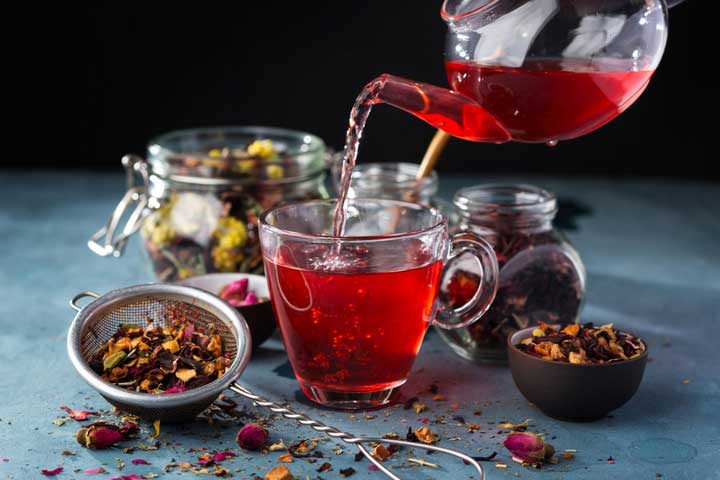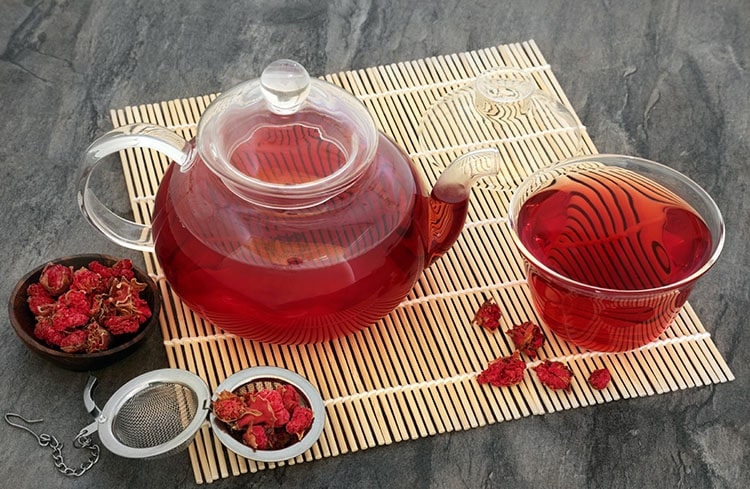
How Turkish Tea Can Boost Your Health and Happiness
This article will discuss Turkish tea, including how it tastes, its health advantages, and how to make it. We’ll also let you know where you can go to buy or sample authentic Turkish tea. By the time you reach the conclusion of this piece, you will have a firmer grasp of the nature, benefits, and preparation of Turkish tea.

After water, tea is the most commonly consumed drink in the world. Did you realise, though, that a specific variety of tea has strong cultural roots in Turkey? Turkish tea is a black tea drink with a robust, rich, and slightly bitter flavour profile. You may improve your health and your mood by drinking Turkish tea, which is wonderful to boot.
The traditions and ideals of the Turkish people are reflected in the way Turkish tea is brewed, served, and enjoyed. The caydanlik, a double-layered teapot, is used to brew the tea, which results in a more concentrated infusion. Beside it are cubes of beetroot sugar, and it is served in little tulip-shaped glasses. It’s drunk slowly and with great appreciation, usually black and without milk.
There’s more to Turkish tea than meets the eye. It represents open arms, sincere friendship, and appreciation. As a gesture of hospitality and kindness, it is given to visitors and total strangers alike. It’s a great way to unwind and bond with loved ones over good company. Because of the antioxidants, polyphenols, and other nutrients it contains, it can also be used to improve health and well-being.
This article will discuss Turkish tea, including how it tastes, its health advantages, and how to make it. We’ll also let you know where you can go to buy or sample authentic Turkish tea. By the time you reach the conclusion of this piece, you will have a firmer grasp of the nature, benefits, and preparation of Turkish tea.
Taste

The strength, quality, and type of tea leaves used all contribute to Turkish tea’s distinctive flavour, which is often described as robust, rich, and slightly bitter. Rize tea, which originates in the Rize area of Turkey, is the most popular variety of Turkish tea. The colour and flavour of Rize tea, which is a deep red, are both robust. Apple tea, a dark and sweet kind, is a favourite among tourists, as is Oralet tea, a fruit tea with flavours including orange, apple, lemon, and cherry.
Sugar cubes made from beets are commonly used to sweeten Turkish tea. Slowly dissolving sugar sweetens the tea without masking its natural flavour. Tea can be improved by the addition of honey or lemon juice, both of which have culinary and medicinal uses.
Milk or any other additions are never added to Turkish tea because doing so would diminish both its flavour and its health advantages. Those who appreciate Turkish tea choose it because of its unadulterated, authentic flavour.
Benefits
There are many positive effects that drinking Turkish tea can have on your body and mind.Some of these advantages are listed below, courtesy of FairTurk.com:
- Turkish tea aids in hydration and the prevention of dehydration, helping to maintain the body’s natural water balance.
- Turkish tea’s antioxidants and polyphenols can protect your cells from free radicals, which can cause cell damage and cancer.
- Turkish tea has a sedative impact on the neurological system, making it useful for relieving stress and sleeplessness.
- Turkish tea’s vitamin and mineral content might help your skin look younger and more supple.
- Invigorating and fortifying the immune system, Turkish tea can help you fight off illness more effectively.
- Turkish tea’s anti-inflammatory and anti-oxidant properties may help reduce the likelihood of developing a malignant brain tumour.
- Making digestion easier, Turkish tea encourages the formation of stomach acid and bile.
- Turkish tea’s anti-inflammatory and probiotic effects can help put an end to diarrhoea by repopulating the gut with healthy bacteria.
- A cup of Turkish tea a day can help your kidneys work more efficiently by eliminating waste and extra water.
- Turkish tea’s ability to reduce blood pressure and cholesterol levels makes it a useful tool for cardiovascular health.
- Keeping cholesterol in check: The metabolic stability and fat buildup prevention afforded by Turkish tea help keep cholesterol in check.
- Aiding in weight loss and stress management, Turkish tea works by reducing cravings and elevating mood.
- By reducing blood sugar levels and increasing insulin sensitivity, Turkish tea can help minimise the chance of developing diabetes.
The social and cultural benefits of drinking Turkish tea might boost your mood as well.Some of these advantages, as outlined by Travel Atelier, are:
Turkish tea promotes mutual understanding and friendship among individuals of diverse cultures and religions by bringing them together around a shared ritual. It’s a great way to meet new people and strike up a conversation with anyone.
- Serving Turkish tea to guests or strangers is a sign of hospitality and friendliness that demonstrates thoughtfulness and kindness. It’s a way to show appreciation for their presence and welcome them into your life.
- Turkish tea’s warm and cosy ambience makes it ideal for socialising and winding down after a long day. It’s a great way to relax and spend time with loved ones.
- One way to offer appreciation and admiration for someone who has helped you or is significant in your life is to serve them a cup of Turkish tea. It’s a gesture of gratitude or appreciation.
Brewing Tips

It takes some practise to perfect the technique of brewing Turkish tea. Instructions for making Turkish tea in a caydanlik, a traditional double-layered teapot:
- Put water in the bottom teapot and heat it until it boils.
- Place the top teapot over the bottom teapot, fill it with loose-leaf tea (approximately a teaspoon each glass), and serve.
- To wet the tea leaves, transfer a small amount of hot water from the lower teapot to the upper one. Tea leaves and water shouldn’t be agitated or shaken.
- For the best flavour, steep the tea for at least 15 minutes in the top teapot.
- When ready to serve, remove the tea concentrate from the top teapot and pour it into a tiny tulip-shaped glass.
- Then, fill the glass with hot water from the bottom teapot. Tea should be diluted with water, to taste.
- Put a cube of beetroot sugar on the saucer next to the glass for flavouring. Drop the sugar cube into your mouth while you sip the tea, or place it in the glass.
Some suggestions on how to keep the tea from getting too bitter:
- Too much oxygen in the water will raise the caffeine content in the tea, giving it a bitter taste if you overboil the water.
- If you steep the tea leaves for too long, you’ll get too much tannin out of the tea and it’ll taste harsh.
- Your tea will taste best if you drink it within 30 minutes of brewing it.
How to ask for the right amount of strength in your Turkish tea:
- Tea concentrate diluted with water makes for a very potent beverage. Other names for this include koyu and demli.
- The standard ratio is one-fourth tea concentrate to three-quarters water. Normal or orta describes this condition.
- Lite means less than a quarter of a glass of tea, therefore this version has extra water added to it. It’s also known as seyreltik or açk.
Here are some tips on how to drink Turkish tea:
- Refusing tea is an insult and should never be done. Take it in stride and express gratitude.
- Take your time and savour each sip of the tea. Do not drink it too quickly or in a gulp.
- To signify that you have had enough and do not wish to receive any more, place a spoon across the top of the glass. Do not show disrespect by leaving the glass half-empty or half-full.
- Put a sugar cube in your mouth and sip the tea, or put some sugar in the glass. Tea loses both flavour and health advantages when milk or sugar is added to it.
Conclusion
In conclusion, Turkish tea is a type of black tea that has strong cultural significance in Turkey. Depending on the intensity, quality, and type of tea leaves used, the flavour can range from mild to quite robust. It is made, presented, and consumed in a certain way that is emblematic of Turkish culture and values.
Turkish tea helps maintain your body’s water balance, blocks the growth of cancer-causing cells, relieves stress and insomnia, strengthens your immune system, lowers cholesterol, eases the effects of stress and obesity, and lowers your risk of developing diabetes, among other benefits. You’ll be happier as a result of the social and cultural connections you’ll be able to make with others and the ways in which you’ll be able to exhibit thanks, respect, friendship, and hospitality to guests and strangers alike.
You Can Also Read Here How to Play Pokemon Marbles: A Fun and Easy Game for Kids
